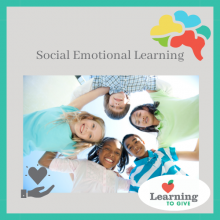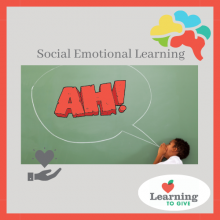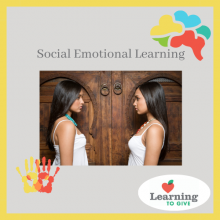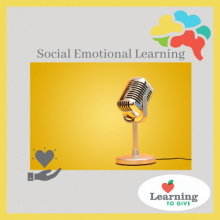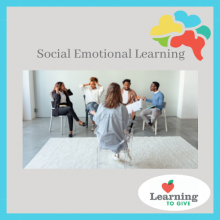Culturally Responsive SEL for Social Justice
These activities linked below empower youth to discuss identity and social issues, and take generous action toward a socially just community. We explore the five core areas of Social Emotional Learning (SEL) through a culturally responsive and culturally affirming lens. See CASEL (Collaborative for Academic, Social, and Emotional Learning) for focused SEL information.
The promise of SEL is that we develop healthy identities, relationships, and emotional intelligence. Culturally responsive, relevant, and affirming SEL activities encourage youth to connect with their strengths, discover what means most to them, and imagine ways they might contribute collaboratively to the world. This practice includes creating safe spaces to talk with courage about what really matters and honestly confront what isn't working, like injustice and hate. The work in this set of resources was inspired by Dena Simmons, who is an expert in SEL, racial justice, and healing.
We recommend that leaders who use these resources pre-read them, practice them, and discuss concepts with colleagues. It is important to be ready to share our own stories and be vulnerable with youth.
SEL Activities by Core Areas
Self Awareness
Self-awareness is "the ability to know the elements of your identity and culture and how these traits define you and relate to others in a diverse community. It also relates to how your strengths and limitations impact yourself and the community." Understanding others and the world requires the ability to recognize one's emotions, thoughts, and values. More self-awareness activities.
- Personal Values and Motivations - This card-sorting activity facilitates discussions about how personal values impact group decisions.
- Privilege for Sale - This activity encourages youth to discuss the power of privilege and how their perspectives, identity, and values influence their decisions
- Privilege Circle - This activity explores how privilege enhances or hinders their access to opportunities.
- Identity Self Portrait - Participants illustrate their visible and invisible identity markers, then reflect upon how these identities interact with how they perceive themselves and how they are perceived by others.
- Identity Journey - Youth explore what makes up an identity, then build a deeper understanding of how their identity impacts the community. With this Read, Research, Reflect, and Reach Out model, youth travel a journey of self-discovery that leads to service.
- Personal Well-Being for the Good of All - Two activities guide young people to recognize the value they have and add to the community.
Self Management
Self-management is "the ability to regulate your words and actions in how they impact the community and those around you." Regulating one's emotions, thoughts, and behaviors in various situations is an important part of self-management. More self-management activities.
- Offensive Language Audit - Language holds the power to unite or divide us, and we may unknowingly use language that excludes or offends our listeners. By managing their own language, youth can serve as models for their peers and others in their community.
- Everyday SEL: The Shout - This activity asks young people to channel their emotions while using their voices to express their anger, sadness, and fear. According to researchers, anger can be used to create change when it is channeled effectively.
- Different Strokes for Different Folks - In this Socratic Seminar activity young people are asked to consider how their race, ethnicity, gender, abilities, or sexuality impact how they interact with others.
- Everyday SEL Exit Tickets - After a meaningful session or day together, a reflective writing prompt can help young people internalize, sort, or articulate their thoughts and feelings.
Social Awareness
Social awareness is "the ability to ask yourself what the needs of the community are and reflect on how the community is handling current issues either regionally or globally." Appreciating diversity, developing empathy, and respecting others are all aspects of social awareness. More social awareness activities.
- Everyday SEL Community Current Event Check-In - This s a culturally responsive version of the daily emotion check-in; it offers youth the opportunity to check-in regarding the current events in their communities.
- Hyphen-Stories - Many American citizens with a "hyphenated ethnicity, race, or identity" experience a double consciousness. In this activity, youth look at the hyphen from the perspective of another person.
- Courageous Conversations - These prompts can be used to facilitate conversations that aim to build empathy and connection by inviting participants to speak and listen from the heart.
Responsible Decision Making
Responsible Decision Making is “the ability to make choices about one’s personal behavior and in advocacy for others based on data, respectfully considering the perspectives of others, or the well-being of the greater good, for today and the future.” It also includes making informed decisions about how we act and interact in light of equity, safety, social norms, and ethical standards. More responsible decision-making activities.
- Nonviolent Protest Simulation - Participants are asked to identify a problem they want to solve and then plan a simulation of a nonviolent protest/demonstration while being conscious of safety, resources, community norms, and ethical behavior.
- Public Service Announcement - Young people create a Public Service Announcement to inform people about an issue and challenge them to take action in order to make a difference.
Relationship Skills
Relationship Skills include "the ability to give and take in the community, awareness of one another's strengths, and full participation as responsible and generous people who matter and respect others." Making and maintaining fulfilling connections with a variety of persons and groups, as well as communicating, cooperating, and negotiating conflict constructively, are all relationship skills. More relationship skills activities.
- Philosophical Chairs Intro to Bias - This activity prompts young people to think and speak critically with their peers about a real-world topic.
- Everyday SEL Reflection Prompts - One of the most effective ways to support youth social emotional growth is with regular check-ins.
